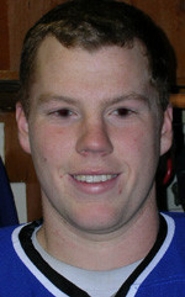
Why do people faint? Travis Blood '09 (Pepperell, Mass.) might be able to tell you. As a research intern at the Integrative Cerebral Hemodynamic Lab in Beth Israel Deaconess Hospital, a facility of Harvard Medical School, Blood works on several projects designed to ascertain why people feel dizzy and what parts of the body account for the process of brain blood flow.
While many of his peers opted for research, Blood was one of more than 20 Hamiltonians who received college funding to participate in a summer internship. Work experience is becoming more and more necessary for college students, but many opportunities are unpaid and require students to pay their own housing and living expenses as well as working for free.
Thanks to alumni and parent donations, Hamilton students can apply for funding to support them while they work in a field of interest with an organization that cannot pay them. Though Blood works in an unpaid internship, he received a stipend from Hamilton's competitive Jeffrey Fund, which provides stipends to one or two students for a full-time, summer, off-campus internship in the sciences.
As a lab intern, Blood is involved in scheduling, organizing, testing, and data analysis in three of the lab's projects. One of these monitors eye position in reaction to pictures; the second does something similar but tests how the eyes compensate when the subject's position also moves. The third test, a NASA-funded experiment named the Upright Tilt Test, involves monitoring the subject as his or her angle is slowly increased from flat to an 80 degree slope. The doctors test the blood pressure, heart rate, and carbon dioxide levels as the subject's angle changes.
Blood's favorite part of his internship is being able to work with the subjects. "I love being a part of the testing and data analysis," he explained. "It makes me feel like I am accomplishing something, instead of just filing papers."
On campus, the neuroscience major plays on the varsity hockey and basketball teams, and writes for The Spectator. He plans to go to medical school after graduation to pursue a career in medicine.
To future interns, he says, "do something you are interested in and do something that is challenging, because the challenge brings great rewards in your work."
-- by Lisbeth Redfield
While many of his peers opted for research, Blood was one of more than 20 Hamiltonians who received college funding to participate in a summer internship. Work experience is becoming more and more necessary for college students, but many opportunities are unpaid and require students to pay their own housing and living expenses as well as working for free.
Thanks to alumni and parent donations, Hamilton students can apply for funding to support them while they work in a field of interest with an organization that cannot pay them. Though Blood works in an unpaid internship, he received a stipend from Hamilton's competitive Jeffrey Fund, which provides stipends to one or two students for a full-time, summer, off-campus internship in the sciences.
As a lab intern, Blood is involved in scheduling, organizing, testing, and data analysis in three of the lab's projects. One of these monitors eye position in reaction to pictures; the second does something similar but tests how the eyes compensate when the subject's position also moves. The third test, a NASA-funded experiment named the Upright Tilt Test, involves monitoring the subject as his or her angle is slowly increased from flat to an 80 degree slope. The doctors test the blood pressure, heart rate, and carbon dioxide levels as the subject's angle changes.
Blood's favorite part of his internship is being able to work with the subjects. "I love being a part of the testing and data analysis," he explained. "It makes me feel like I am accomplishing something, instead of just filing papers."
On campus, the neuroscience major plays on the varsity hockey and basketball teams, and writes for The Spectator. He plans to go to medical school after graduation to pursue a career in medicine.
To future interns, he says, "do something you are interested in and do something that is challenging, because the challenge brings great rewards in your work."
-- by Lisbeth Redfield
Posted July 12, 2007
